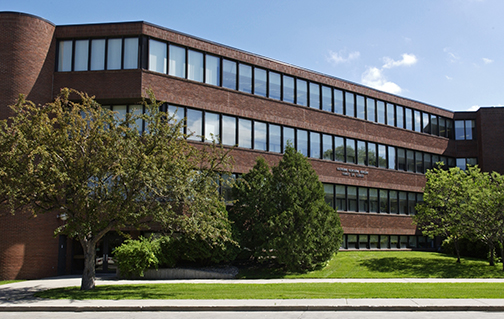
Biological Sciences Education
This is an archived copy of the 2020-21 catalog. To access the most recent version of the catalog, please visit http://bulletin.ndsu.edu.
Biological sciences, in the broadest sense, is the study of life. As such, it is a subject of great diversity and requires a background in many academic disciplines.
The Program
Candidates in the Biological Sciences education major are prepared to teach a diverse curriculum to a diverse student population. The Biological Sciences education student should work closely with their advisor to be sure that the general education courses taken will provide a strong foundation for advanced courses in the major.
Professional Education Courses
Students have to enroll in the 300-level professional education courses before applying to be formally admitted to the School of Education (SOE). Prior to enrolling in the 400-level courses, students must complete the application for admission to the SOE; attain a minimum of a 2.75 grade point average overall in their course work and education courses, and pass the Praxis Core Academic Skills for Educators exam(s). Requirements for admission can be found on the School of Education website.
STUDENT TEACHING
Student teaching is the culmination of the teacher preparation program. Students have the opportunity to apply knowledge and skills acquired in college courses under the supervision of an experienced biological sciences educator.
STUDENT ADVISEMENT
Students will be assigned individual advisors who will work with them closely in program planning and in other ways to advise and assist them. Students are encouraged to seek their advisor's help whenever needed.
CERTIFICATION
Upon completing this program, graduates are eligible for teacher licensure from the North Dakota Education Standards and Practices Board (ESPB). The program is accredited by the Council for the Accreditation of Educator Preparation (CAEP).
Career Opportunities
Students who major in Biological Sciences education get hired to teach biological science courses at the middle and high school level. To expand their choices, students can take the General Science licensure exam to become eligible to teach multiple science disciplines at the middle or high school levels, or can elect to double major in Biological Sciences Education and Biological Sciences or add coursework in other fields of science to increase teacher licensure areas. One can also work in a variety of employment positions with the Biological Sciences major.
| First Year | |||
|---|---|---|---|
| Fall | Credits | Spring | Credits |
| BIOL 150 & 150L | 4 | BIOL 151 & 151L | 4 |
| ENGL 110 (or 120 College Composition II based on placement) | 4 | COMM 110 | 3 |
| GEOL 105 & 105L (Global Perspectives Gen Ed requirement) | 4 | ENGL 120 | 3 |
| MATH 105 or 146 | 3-4 | GEOL 106 & 106L | 4 |
| Social & Behavioral Science Gen Ed* | 3 | ||
| 15-16 | 17 | ||
| Second Year | |||
| Fall | Credits | Spring | Credits |
| BIOL 220 & 220L | 4 | BIOL 221 & 221L | 4 |
| CHEM 121 & 121L | 4 | BIOL 252 | 3 |
| EDUC 321 | 3 | CHEM 122 & 122L | 4 |
| MICR 202 & 202L | 3 | EDUC 322 | 3 |
| Humanities & Fine Arts Gen Ed* | 3 | Social & Behavioral Sciences Gen Ed* | 3 |
| Pass Praxis Core Academic Skills Exam | Apply to the School of Education | ||
| 17 | 17 | ||
| Third Year | |||
| Fall | Credits | Spring | Credits |
| BIOL 315 & 315L | 4 | BIOL 359 | 3 |
| BIOL 364 | 3 | EDUC 481 | 3 |
| EDUC 451 | 3 | EDUC 486 | 3 |
| PHYS 120 & 120L | 4 | SOIL 217 | 3 |
| Wellness Gen Ed | 2 | STAT 330 | 3 |
| 16 | 15 | ||
| Fourth Year | |||
| Fall | Credits | Spring | Credits |
| BIOL 370 | 3 | EDUC 485 | 1 |
| Apply for Student Teaching | EDUC 487 | 9 | |
| EDUC 482 | 3 | EDUC 488 | 3 |
| EDUC 489 | 3 | ||
| ENGL 324 | 3 | ||
| Humanities & Fine Arts Gen Ed* | 3 | ||
| Complete PLT (grades 7-12) Exam | |||
| Complete Subject Area Assessment Exam | |||
| 15 | 13 | ||
| Total Credits: 125-126 | |||
| * | One of these General Education courses needs to be selected from Category D - Cultural Diversity. |
